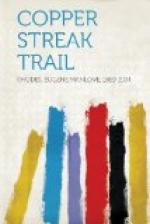“I’ve got him!” shrieked the blue boy.
The red pony turned mild bright eyes upon brown Awguan, and twitched red velvet ears to express surprise, and wrinkled a polite nose.
“Hello! I hadn’t noticed you before. Fine day, isn’t it?” said the ears.
Awguan rolled his wicked eye and snorted. The blue boy shrilled a comment of surprising particulars—a hatless boy in denim. Stanley turned his head at a clatter of hoofs; Something Dewing, on the trail from town, galloped to join them.
“That was a creditable arrest you made, Mitchell,” he said, drawing rein. “I saw it all from the top of Mule Hill. And I certainly thought our Little Boy Blue was going to take the Big Trip. He’ll make a hand!”
The gambler’s eyes, unguarded and sincere for once, flashed quizzical admiration at Little Boy Blue, who, concurrently with the above speech, quavered forth his lurid personal opinions of the red pony. He was a lean, large-eyed person, apparently of some nine or ten years—which left his vocabulary unaccounted for; his face was smeared and bleeding, scratched by catclaw; his apparel much betattered by the same reason.
He now checked a flood of biographical detail concerning the red pony long enough to fling a remark their way:
“Ain’t no Boy Blue—damn your soul! Name’s Robteeleecarr!”
Dewing and Mitchell exchanged glances.
“What’s that? What did he say?”
“He means to inform you,” said Dewing, “that his name is Robert E. Lee Carr.” His glance swept appraisingly up the farther hill, and he chuckled: “Old Israel Putnam would be green with envy if he had seen that ride. Some boy!”
“He must be a new one to Cobre; I’ve never seen him before.”
“Been here a week or ten days, and he’s a notorious character already. So is Nan-na.”
“Nan-na, I gather, being the pony?”
“Exactly. Little Apache devil, that horse is. Robert’s dad, one Jackson Carr, is going to try freighting. He’s camped over the ridge at Hospital Springs, letting his horses feed up and get some meat on their bones. Here! Robert E. Lee, drop that club or I’ll put the dingbats on you instanter! Don’t you pound that pony! I saw you yesterday racing the streets with the throat-latch of your bridle unbuckled. Serves you right!”
Robert E. Lee reluctantly abandoned the sotol stalk he had been breaking to a length suitable for admonitory purposes.
“All right! But I’ll fix him yet—see if I don’t! He’s got to pack me back up that hill after my hat. Gimme a knife, so’s I can cut a saddle string and mend this bridle.” These remarks are expurgated.
He mended the bridle; he loosened the cinches and set the saddle back. Stan, dismounting, made a discovery.
“I’ve lost a spur. Thought something felt funny. Noticed yesterday that the strap was loose.” He straightened up from a contemplation of his boot heel; with a sudden thought, he searched the inner pocket of his coat. “And that isn’t all. By George, I’ve lost my pocketbook, and a lot of money in it! But it can’t be far; I’ve lost it somewhere on my boy chase. Come on, Dewing; help me hunt for it.”




